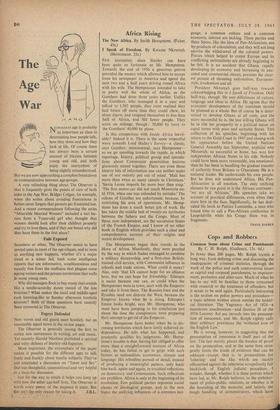seeing (though dimly) that America could no longer remain isolated
from foreign conflicts, that the federal government must assume far greater control over the national economy, that the labour unions must become major nego- tiators, and that the 'social surplus' (Weyl's term for the wealth created by the otherwise reprehensible American acquisitive spirit) made the Marxist vision of the proletariat irrelevant to the United States.
No doubt, as Mr. Forcey insists, the trio had limitations. They were urban and Eastern, with little understanding of agriculture and of other regions. They were a little naïve in being so delighted by invitations to lunch with the political great. The autopsy of their work on the New Republic and afterwards—their panaceas and scoldings, their egotistical belief that they had manipulated events, their high- minded but possibly wrongheaded attack upon the Treaty of Versailles—presents a somewhat disquieting picture of theorists unable to per- form sensibly or consistently. Kennedy's New Frontier, with its contingent of academic theorists, inevitably conies to mind. The decline of the New Liberalism is in truth a dismal story.
But Mr. Forcey's explanations are much too simple and confused. Arguing that Croly and Co., instead of influencing events, were them- selves influenced and so made to temporise and lose their necessary detachment, he suggests that American intellectuals should stay out of practical politics. He describes his trio as 'moths drawn to the light' and speaks of Croly's 'neurotic obsession' with strong leadership. But there are many different kinds of intellectuals. Some are palpably misplaced in fields of practical application. Others may have a great deal to contribute, not merely as remote theorists. Croly and Co. were (Mr. Forcey's word) 'publicists.' They wanted to be in the know, like all good political journalists, and in the swim, even if this meant getting in the soup. Their relations with the White House were equivocal, and unsatisfactory. But the Admin- istration, set apart from and often at odds with Congress in the very nature of the system, has long tended to surround itself with court jesters, grey eminences, kitchen Cabinets and brains trusts who have no official role. One President will choose poker-playing cronies, another Harvard professors. In the absence of a Cabinet directly responsible to Congress, the untidy pattern will continue. Again, it is in the nature of the American presidential situation that hardened politicians no less than intellectuals look for a charismatic leader. Mark Hanna's feeling for McKinley was not incomparably less intense than Croly's for that most charismatic of dismounted cavalrymen, Theodore Roosevelt.
As for the inadequacy of Prog-Lib doctrine, Mr. Forcey seems to contend (his train of thought is not clear) that all forms of liberalism are ineffectual in twentieth-century America be- cause they are too middle-class, too wishy- washy. He cites New Deal reforms as proof : a dubious proof? It is hard to see what he would propose instead. Certainly no one could deny the weaknesses of the amorphous line known as American liberalism. But on the evi- dence of his book, we ought not to write off Croly and Co. without attaching far more weight than Mr. Forcey does to two external factors : the First World War, which confronted American reformers with agonising dilemmas, and the rise of Communism, which outflanked all less radical creeds and made pragmatism appear a vice instead of a virtue.
DARRELL BATES
The Shell at My Ear
An ironic and perceptive chron- icle of the joys and pains of grow- ing up by the author of A Fly- -switch from the Sultan, whose story-telling has been likened by Eric Linklater and the Economist to Sir Arthur Grimble's.
18s
James Agate
AN ANTHOLOGY
Introduced by Alan Dent `The extracts from the nine famous Egos and other writings suggest how much personal charm there was in one who was (as The Times put it) "boyishly enchanted with the astonishing romance of his professional career." And Agate's reason for being so enchanted was that he himself was "the astonishing romance".' SUNDAY TELEGRAPH


































 Previous page
Previous page